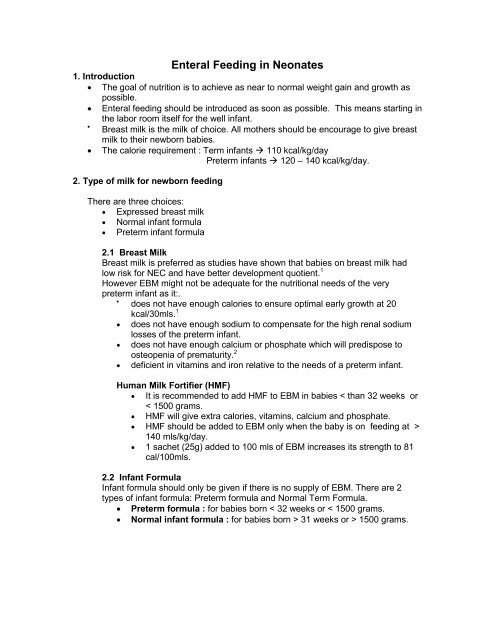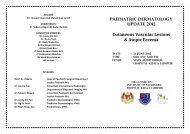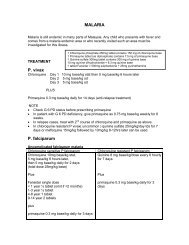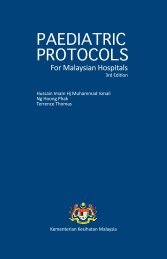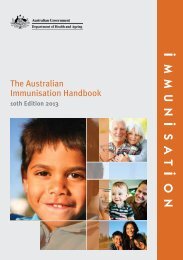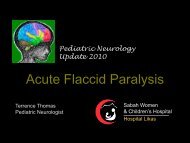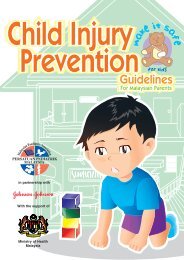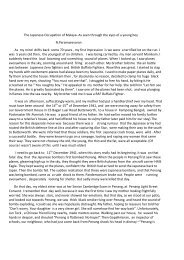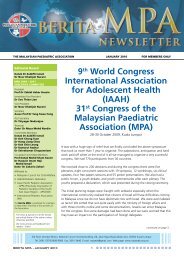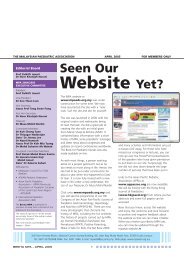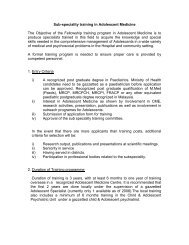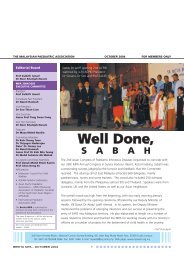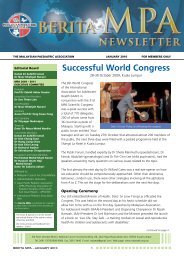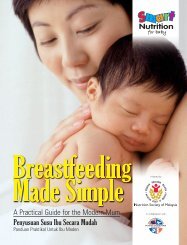Contents Chapter Topic Page Neonatology Respiratory Cardiology
Contents Chapter Topic Page Neonatology Respiratory Cardiology
Contents Chapter Topic Page Neonatology Respiratory Cardiology
Create successful ePaper yourself
Turn your PDF publications into a flip-book with our unique Google optimized e-Paper software.
Enteral Feeding in Neonates<br />
1. Introduction<br />
• The goal of nutrition is to achieve as near to normal weight gain and growth as<br />
possible.<br />
• Enteral feeding should be introduced as soon as possible. This means starting in<br />
the labor room itself for the well infant.<br />
•<br />
Breast milk is the milk of choice. All mothers should be encourage to give breast<br />
milk to their newborn babies.<br />
• The calorie requirement : Term infants 110 kcal/kg/day<br />
Preterm infants 120 – 140 kcal/kg/day.<br />
2. Type of milk for newborn feeding<br />
There are three choices:<br />
• Expressed breast milk<br />
• Normal infant formula<br />
• Preterm infant formula<br />
2.1 Breast Milk<br />
Breast milk is preferred as studies have shown that babies on breast milk had<br />
low risk for NEC and have better development quotient. 1<br />
However EBM might not be adequate for the nutritional needs of the very<br />
preterm infant as it:.<br />
•<br />
does not have enough calories to ensure optimal early growth at 20<br />
kcal/30mls. 1<br />
• does not have enough sodium to compensate for the high renal sodium<br />
losses of the preterm infant.<br />
• does not have enough calcium or phosphate which will predispose to<br />
osteopenia of prematurity. 2<br />
• deficient in vitamins and iron relative to the needs of a preterm infant.<br />
Human Milk Fortifier (HMF)<br />
• It is recommended to add HMF to EBM in babies < than 32 weeks or<br />
< 1500 grams.<br />
• HMF will give extra calories, vitamins, calcium and phosphate.<br />
• HMF should be added to EBM only when the baby is on feeding at ><br />
140 mls/kg/day.<br />
• 1 sachet (25g) added to 100 mls of EBM increases its strength to 81<br />
cal/100mls.<br />
2.2 Infant Formula<br />
Infant formula should only be given if there is no supply of EBM. There are 2<br />
types of infant formula: Preterm formula and Normal Term Formula.<br />
• Preterm formula : for babies born < 32 weeks or < 1500 grams.<br />
• Normal infant formula : for babies born > 31 weeks or > 1500 grams.


